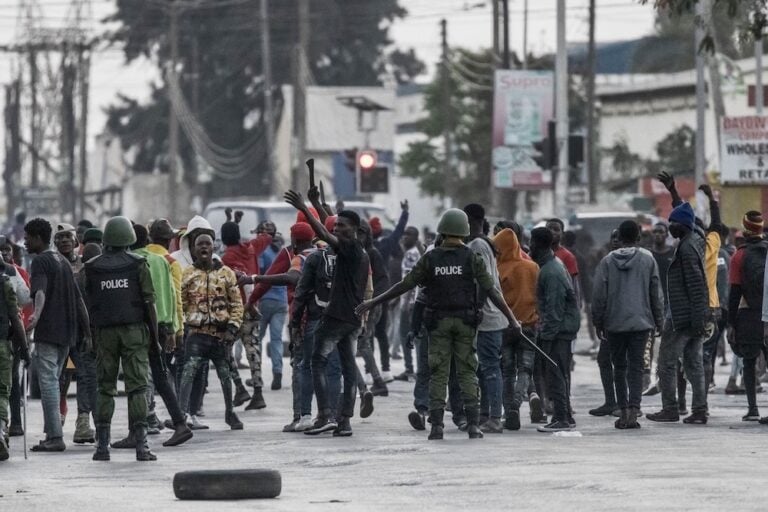(MISA/IFEX) – On 20 March 1999, two more journalists from the “Post” newspaper were arrested at their homes and taken to Chestone police station in the Zambian capital where they were charged with espionage. **Updates IFEX alerts of 19 March, 18 March, 17 March, 15 March, 12 March, 11 March and 10 March 1999** Senior […]
(MISA/IFEX) – On 20 March 1999, two more journalists from the “Post”
newspaper were arrested at their homes and taken to Chestone police
station
in the Zambian capital where they were charged with espionage.
**Updates IFEX alerts of 19 March, 18 March, 17 March, 15 March, 12
March,
11 March and 10 March 1999**
Senior reporters at the paper confirmed to the Zambian Independent Media
Association (ZIMA) that Douglas Hapande and MacPherson Muyumba were
picked
up at their homes and charged with the same offence that six other
reporters
had been charged with.
The two reporters were briefly detained and later released. They are
expected to appear in court for mention on 16 April together with the
six
other journalists.
According to staff at the paper, police also went to the homes of the
“Post”
managing editor Fred M’membe and senior reporter Rueben Phiri but did
not
find them.
Background Information
The six “Post” reporters who received summonses on 17 March were charged
with
espionage and released on bail of K100 000 (US$43) on 18 March. They
were
not asked to plead and were told to reappear in court on 16 April. The
six
journalists are: Brighton Phiri, Kelvin Shimo, Joe Kaunda, Amos
Malupenga,
Lubasi Katunda and Goodson Machona.
The six were previously arrested on 9 March and 10 March, apparently
after
an order for the police to arrest all “Post” journalists before dawn on
10
March. They were released on 12 March following a harbeas corpus
application by the newspaper.
The arrest of the reporters was coupled with a siege of the “Post”
editorial
offices and its separately located printing press, resulting in a delay
of
several hours in the printing of the paper. On 10 March, police
surrounded
the two buildings and prevented anyone from entering or leaving, while
also
cutting the power and water supply. On 11 March, the “Post” failed to
appear
on the streets of Lusaka as scheduled, the first time this had happened
in
its seven-year history. Those trapped in the building housing the
printing
press managed to print the paper, but the police prevented it from being
distributed. The 11 March edition of the paper was eventually sold
openly on
the streets of Lusaka on the next day.
The crackdown on the “Post” followed an uproar caused in the National
Assembly stemming from the lead story in the paper on 9 March. The story
questioned the military capacity of Zambia to withstand an incursion
from
neighbouring Angola.
The article in question can be read on the Internet at:
http://www.zamnet.zm/zamnet/post.arch.20742/news/fpstory.html
In a statement on 19 March, the International Federation of Journalists
(IFJ) expressed concern about the charges laid against the “Post”
journalists. According to the IFJ, the article in question did not
warrant
charges of espionage brought against the journalists.
Recommended Action
Send appeals to the President:
the
blocking of the circulation of “The Post” after the appearance of the
“offending” article
action suggests that they were using the appearance of the article as an
excuse to shut down “The Post”, an action which they have failed to
fulfil
in the past despite various suits and attacks against the paper
Appeals To
Frederick Chiluba
President of the Republic of Zambia
State House
Lusaka, Zambia
Fax: +260 1 221939
E-mail: state@zamnet.zm / mfalus@zamnet.zm
Please copy appeals to the source if possible.


